 |  |  | |
An up close and personal interview with U.S. Army Veteran and Togetherweserved.com Member:
MAJ Russell Widener U.S. Army (Ret) (1964-1994)
PLEASE DESCRIBE WHO OR WHAT INFLUENCED YOUR DECISION TO JOIN THE ARMY?
I am not certain how to respond to this. Some individuals enter the military because of a family history of uniformed service. Others enter for the challenge a military life presents. I will respond by looking at the study of human growth and development in answering this question. Does environment 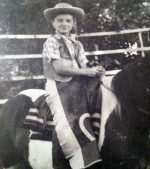 or genetics determine the path of one's life after birth? or genetics determine the path of one's life after birth?
The "Genetic" argument: I was adopted at birth. I was one of 8 children and adopted by another family at birth. Two other children were also adopted out of the same family but at different stages of their lives. After I graduated from high school and committed to serve in the US Army, I discovered that one of my blood brothers also was in the army. Still later, after my service in Vietnam was complete, I discovered that my real brother served in Vietnam as a South Vietnam Army advisor. His assignment area was I Corps near the DMZ, the same section where I was assigned. He also served during the same time frame and received awards and decorations almost identical to mine. He ultimately retired after many years of service with the rank of Command Sergeant Major (CSM).
The "Environmental" argument: My adopted family came from a strong line of... civilians. My dad was an industrial worker as well as a farmer. His dad was a teacher. There was no military history present in the ancestral tree. However, they were very supportive during my upbringing giving me a great and full life and supported any decisions I made. Later in life, I started taking undergraduate evening courses with the University of Maryland while stationed in Italy. I then left active duty to attend college at the University of Tennessee and received a Bachelor of Science degree. I was the first college graduate in both of my families.
Consciously, I think that I joined the military because I was due to graduate from high school and needed a job. Subconsciously I think it fulfilled a need of mine to become an adult instead of remain a teenager.
WHETHER YOU WERE IN THE SERVICE FOR SEVERAL YEARS OR AS A CAREER, PLEASE DESCRIBE THE DIRECTION OR PATH YOU TOOK.
 I went into the reserves, served my 6 months in basic and advanced infantry training and returned to my hometown. Approximately 1-2 years later, my unit was deactivated and I was moved to the Individual Reserve Replacement branch (IRR). After the USS Pueblo was boarded and the crew captured by North Korean forces in international waters in the Sea of Japan on January 23, 1968, I was called to active duty as a "filler" to the 100th Battalion, 442nd Infantry in Schofield Barracks, Hawaii. In 1969, I took the tests for pilot training with the army and had my application in processing when I was ordered to Vietnam. I went into the reserves, served my 6 months in basic and advanced infantry training and returned to my hometown. Approximately 1-2 years later, my unit was deactivated and I was moved to the Individual Reserve Replacement branch (IRR). After the USS Pueblo was boarded and the crew captured by North Korean forces in international waters in the Sea of Japan on January 23, 1968, I was called to active duty as a "filler" to the 100th Battalion, 442nd Infantry in Schofield Barracks, Hawaii. In 1969, I took the tests for pilot training with the army and had my application in processing when I was ordered to Vietnam.
I served with Company B, 1st Battalion, 61st Infantry, 5th Infantry Division (Mechanized) in I Corps, Quang Tri Province. In November, 1969, I was ordered back from Vietnam and exited the service. I soon became "disenchanted" and went back on active duty. After numerous assignments and quick promotions, I achieved the rank of Staff Sergeant. I also received orders for Drill Sergeant School. After much pleading, the army stuck to their guns and 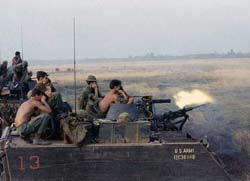 I stuck to mine. I exited the army and entered the University of Tennessee in Knoxville while staying in the US Army Reserves. There I earned a Direct Commission secondary to my Vietnam combat experience and several awards. After making 1st Lieutenant in Armor in the reserves, I graduated in June, 1980 with a BS in Nursing. I re-entered the army (again) as an officer a 2nd Lieutenant and started working my way up the chain. I served another 14 years as an officer and retired with 21 years of service in 1994. I stuck to mine. I exited the army and entered the University of Tennessee in Knoxville while staying in the US Army Reserves. There I earned a Direct Commission secondary to my Vietnam combat experience and several awards. After making 1st Lieutenant in Armor in the reserves, I graduated in June, 1980 with a BS in Nursing. I re-entered the army (again) as an officer a 2nd Lieutenant and started working my way up the chain. I served another 14 years as an officer and retired with 21 years of service in 1994.
IF YOU PARTICIPATED IN COMBAT, PEACEKEEPING OR HUMANITARIAN OPERATIONS, PLEASE DESCRIBE THOSE WHICH WERE THE MOST SIGNIFICANT TO YOU AND, IF LIFE-CHANGING, IN WHAT WAY.
Serving in a combat zone is truly life-changing in so many ways. I learned that life is sometimes very fragile at best but always precious. After a number of very close calls with death, I began to wonder if there is a "plan" in life's journey. When I saw small  children rummaging through trash piles for anything of value as we departed an area, I realized how cruel mankind can be. It then became even more cruel when I saw adults ripping these items from the children's hands for themselves. children rummaging through trash piles for anything of value as we departed an area, I realized how cruel mankind can be. It then became even more cruel when I saw adults ripping these items from the children's hands for themselves.
Finally, I returned to the United States with a much better understanding of the term, "perspective." Electricity, paved highways, shopping malls, wide varieties of food available on store shelves and, yes, the proverbial, "toilets that flush" become elevated to an almost religious status.
When compared to many of the world's countries, we are both a blessed and spoiled group of citizens. It is sad when you realize the only true way for us as a people to learn this is to experience what I and many others did through conflict in a much different setting.
OF ALL YOUR DUTY STATIONS OR ASSIGNMENTS, WHICH ONE DO YOU HAVE FONDEST MEMORIES OF AND WHY? WHICH ONE WAS YOUR LEAST FAVORITE?
I have many fond memories and experiences of numerous assignments. Hawaii seems to top them all
At the time I was called from reserve to active duty status, I was ordered to Schofield Barracks, Hawaii to serve with the famed 100th Battalion, 442nd Infantry, known as the "Nisei" battalion. Their rich  history comes from WWII in Europe, primarily in Italy, southern France and Germany. The 442nd is one of the most decorated unit in military history with it's soldiers earning 1 Congressional Medal of Honor of which 19 were upgraded to Medals of Honor; 52 Distinguished Service Crosses; 1 Distinguished Service Medal; 588 Silver Stars; 22 Legion of Merit medals; 19 Soldier's Medals; 5,200 Bronze Stars and 14 Croix de Guerre, among many other decorations. Its motto was "Go for Broke". Even though the unit was a reserve unit called to active duty to replace the 25th Infantry "Tropical Lightening" Division at Schofield, it was an honor working, learning and training with these soldiers. history comes from WWII in Europe, primarily in Italy, southern France and Germany. The 442nd is one of the most decorated unit in military history with it's soldiers earning 1 Congressional Medal of Honor of which 19 were upgraded to Medals of Honor; 52 Distinguished Service Crosses; 1 Distinguished Service Medal; 588 Silver Stars; 22 Legion of Merit medals; 19 Soldier's Medals; 5,200 Bronze Stars and 14 Croix de Guerre, among many other decorations. Its motto was "Go for Broke". Even though the unit was a reserve unit called to active duty to replace the 25th Infantry "Tropical Lightening" Division at Schofield, it was an honor working, learning and training with these soldiers.
Photo is of the late Senator Daniel Inouye (Hawaii) receiving his Medal of Honor from President William Clinton.
FROM YOUR ENTIRE SERVICE, INCLUDING COMBAT, DESCRIBE THE PERSONAL MEMORIES WHICH HAVE IMPACTED YOU MOST?
 1. The date was Saturday, August 23, 1969. The location: the Republic of South Vietnam, Quang Tri Province on the demilitarized zone. I was assigned to a mine sweep team the next day from Firebase A4 to Firebase C2. I prepared my equipment. Early the next morning, as I exited my APC (Armored Personnel Carrier) to begin the assigned mission, my platoon leader realized that because I was needed to perform my primary duty in fire direction control for the mortar platoon, another soldier would need to replace me. 1. The date was Saturday, August 23, 1969. The location: the Republic of South Vietnam, Quang Tri Province on the demilitarized zone. I was assigned to a mine sweep team the next day from Firebase A4 to Firebase C2. I prepared my equipment. Early the next morning, as I exited my APC (Armored Personnel Carrier) to begin the assigned mission, my platoon leader realized that because I was needed to perform my primary duty in fire direction control for the mortar platoon, another soldier would need to replace me.
At the same time, a fellow soldier and platoon member, Spec 4 Roy McLennan, was walking past in the immediate area. My platoon leader ordered Specialist McLennan to replace me. When McLennan indicated that his personal equipment was elsewhere, I provided him with my own, to include my rifle. Minutes later, just outside the perimeter, Sp4 McLennan stepped on an anti-personnel device, killing him and two other members of the team. Hours later, someone gave me all that remained of my equipment, the trigger housing of my M-16 rifle.
2. One of the battles with the NVA that we were involved with was near Khe Sahn in June, 1969, I had the inadvertent "fortune" or "misfortune" to talk with the FAC (Forward Air Controller) on the radio in the middle of the battle. We almost did not get the fighters in the middle of the night because they dropped their arsenal using radio towers for "triangulation." One of the towers was inoperable until the last moment. When the first bomb finally dropped, all I heard was a "whoosh" immediately followed by a huge blast that knocked me off my feet.
I don't know how I got to the handset used to communicate with the FAC but I did. I screamed to the FAC, "Christ, get them outa here - we'll fight them ourselves." The voice of the FAC is the import of this story... through all of the "crap" flying through the air, the explosions, etc., I distinctly remember the FAC's calm, steady voice say, "Roger, I understand that was a little close - I'll move them back." I still remember holding the radio handset at an arm's length screaming, "... A little close?... a little close? You call that a little close?"
The following day, we returned to our base at LZ Sharon. I hitched a ride with two Air Force sergeants and told them the story. They proceeded to inform me that they were the ones who got the third tower operating the previous night. Without them, and many others, I would not be telling you this story.
One of the few items on my "Bucket List" is to talk with that FAC and thank him for being, "... a little too close." Once more, "Fate" jumped in...
3. Somewhere around October, 1969, I was sitting in the back of our Fire Direction Control Armored Personnel Carrier with two other soldiers. 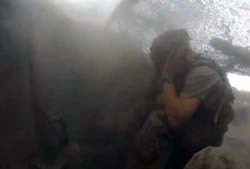 The platoon was in the process of repositioning our mortar tracks. The rear gate of our track was open when an APC drove by the edge of our back door. The driver missed our door but hit the anti-tank mine just beyond it and about 3-to-4 feet from where I was seated. The explosion sent the two other soldiers inside the APC home, but all I received was a scratch just under my right eye. Another stroke of "someone or something" looking over me. The platoon was in the process of repositioning our mortar tracks. The rear gate of our track was open when an APC drove by the edge of our back door. The driver missed our door but hit the anti-tank mine just beyond it and about 3-to-4 feet from where I was seated. The explosion sent the two other soldiers inside the APC home, but all I received was a scratch just under my right eye. Another stroke of "someone or something" looking over me.
4. November 13th, 1969, our unit was setting up our Night Defensive Perimeter (NDP) on Hill 162. As I was out on the perimeter assisting to establish defensive positions, a resupply helicopter landed on the other side of the hill. After they left and upon my return to the NDP center, I was told that they were calling my name. I had orders to return to the states. That night, we were hit with a very heavy NVA attack lasting for 3-to-4 hours. The next morning, we packed up and returned to our home base near Quang Tri. When I entered our company's headquarters, the clerk informed me that not only did I have unexpected orders to return to the United States but also the position for door gunner that I had applied for weeks earlier had been disapproved. Good fortune?... again?
WHAT ACHIEVEMENT(S) ARE YOU MOST PROUD OF FROM YOUR MILITARY CAREER? IF YOU RECEIVED ANY MEDALS FOR VALOR OR OTHER SIGNIFICANT AWARDS, PLEASE DESCRIBE HOW THESE WERE EARNED.
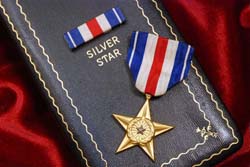 Silver Star Silver Star
Awarded for actions during the Vietnam War
The President of the United States of America, authorized by Act of Congress July 9, 1918 (amended by an act of July 25, 1963), takes pleasure in presenting the Silver Star to Sergeant Russell Keith Widener, United States Army, for gallantry in action while engaged in military operations involving conflict with an armed hostile force in the Republic of Vietnam. Sergeant Widener distinguished himself by valorous actions on 13 November 1969 as a mortar section leader of Company B, 1st Battalion (Mechanized), 61st Infantry Regiment, 5th Infantry Division (Mechanized), during the defense of a night perimeter. A numerically superior force of North Vietnamese Army Regulars engaged the Company's perimeter with a devastating barrage of mortar, rocket-propelled grenade, and small arms fire. Sergeant Widener, with complete disregard for his own safety, fearlessly moved from position to position providing encouragement and leadership, administered first aid to more than fifteen seriously injured comrades, and personally eliminated an aggressor about to throw a grenade into the position where he was treating a casualty. His knowledge of first aid saved many lives and was largely responsible for conserving the unit's fighting strength. Sergeant Widener's gallantry and selflessness were in keeping with the highest traditions of the military service and reflect great credit upon himself, his unit and the United States Army.
General Orders: Headquarters, XXIV Corps, General Orders No. 4 (January 3, 1970)
OF ALL THE MEDALS, AWARDS, QUALIFICATION BADGES OR DEVICES YOU RECEIVED, PLEASE DESCRIBE THE ONE(S) MOST MEANINGFUL TO YOU AND WHY?
 Some awards are given to soldiers for "continuing to breath" after a 90-day period. Others, such as the Silver Star, Bronze Star, Purple Heart, Combat Infantry Badge and multiple Meritorious Service Medals are meaningful because I realize that I am only the "caretaker" most of these awards. They also belong to numerous soldiers who trained, fought and, sometimes, died next to me. I carry my awards in my heart and display them on my wall with pride, both for myself and the many other soldiers served with me. Some awards are given to soldiers for "continuing to breath" after a 90-day period. Others, such as the Silver Star, Bronze Star, Purple Heart, Combat Infantry Badge and multiple Meritorious Service Medals are meaningful because I realize that I am only the "caretaker" most of these awards. They also belong to numerous soldiers who trained, fought and, sometimes, died next to me. I carry my awards in my heart and display them on my wall with pride, both for myself and the many other soldiers served with me.
WHICH INDIVIDUAL(S) FROM YOUR TIME IN THE MILITARY STAND OUT AS HAVING THE MOST POSITIVE IMPACT ON YOU AND WHY?
 Michael Custer, an Army Nurse Corps officer, was, and is, one the most competent, intelligent and sensitive leaders and officers I have ever encountered. He retired after many years of service with a PhD and the rank of Colonel. A true quality leader, human being and friend. Michael Custer, an Army Nurse Corps officer, was, and is, one the most competent, intelligent and sensitive leaders and officers I have ever encountered. He retired after many years of service with a PhD and the rank of Colonel. A true quality leader, human being and friend.
COL. Mary Messerschmitt, US Army Nurse Corps. She was a true leader in every aspect of her tenure in the US Army. I am proud to have served under her.
SGT William Howard, B Company, 1st Battalion, 61st Infantry, 5th Infantry Division (Mechanized), Republic of South Vietnam. We worked Fire Direction Control (FDC) for our mortar platoon. We worked together very well. He was an excellent leader for the whole platoon. A true role model.
SP4 Roy D. McLennan, 11C Mortars, KIA August 24th, 1969. A last-minute change in orders put him on a mine sweep operation instead of me. He stepped on a mine and was killed. Vietnam War Memorial Panel 19W, 108. He is with me every day.
CAN YOU RECOUNT A PARTICULAR INCIDENT FROM YOUR SERVICE WHICH MAY OR MAY NOT HAVE BEEN FUNNY AT THE TIME, BUT STILL MAKES YOU LAUGH?
 1. One cold, fall morning in Virginia, our unit was training and qualifying on the tank range. I was standing between my 1st Sergeant and another Master Sergeant drinking a nice hot cup of coffee when the first round from a tank went downrange. The coffee suddenly disappeared from my cup and mysteriously reappeared on my 1st Sergeant's face and shirt. The following 10-to-20 seconds were more like minutes... until "Top" started laughing. I immediately joined the laughter and started a simultaneous retrograde movement from the immediate area. 1. One cold, fall morning in Virginia, our unit was training and qualifying on the tank range. I was standing between my 1st Sergeant and another Master Sergeant drinking a nice hot cup of coffee when the first round from a tank went downrange. The coffee suddenly disappeared from my cup and mysteriously reappeared on my 1st Sergeant's face and shirt. The following 10-to-20 seconds were more like minutes... until "Top" started laughing. I immediately joined the laughter and started a simultaneous retrograde movement from the immediate area.
2. A rainy day for training at Fort Meade, MD. A 2nd Lt (Name withheld) attempted to cross a fast-running stream in his Armored Personnel Carrier (APC). It was swept off the road into a deep hole in the stream almost drowning the driver and himself. After that, he was know as "Snorkel XXX man."
WHAT PROFESSION DID YOU FOLLOW AFTER YOUR MILITARY SERVICE AND WHAT ARE YOU DOING NOW? IF YOU ARE CURRENTLY SERVING, WHAT IS YOUR PRESENT OCCUPATIONAL SPECIALTY?
Retired in 1994 from the army as a Major, Army Nurse Corps. I held multiple medical positions afterwards in patient care and administrative areas. Now the word "retired" just means that I am tired... again. Every once in a while, I get a surge of energy and go to the gym, open the door, say hello to everyone and... go home. Still tired.
WHAT MILITARY ASSOCIATIONS ARE YOU A MEMBER OF, IF ANY? WHAT SPECIFIC BENEFITS DO YOU DERIVE FROM YOUR MEMBERSHIPS?
 Society of the 5th Infantry Division. I benefited from being a member of the 5th Infantry Division (Mechanized) in Vietnam. While serving with this unit, I learned more about what is really important in life. My priorities and my perspective of life changed - all for the better. Society of the 5th Infantry Division. I benefited from being a member of the 5th Infantry Division (Mechanized) in Vietnam. While serving with this unit, I learned more about what is really important in life. My priorities and my perspective of life changed - all for the better.
IN WHAT WAYS HAS SERVING IN THE MILITARY INFLUENCED THE WAY YOU HAVE APPROACHED YOUR LIFE AND YOUR CAREER?
I experienced many military educational and leadership courses and great assignments. I received a college degree free and a regular army commission. I lived (and live) life with all of it's "good" and "bad" portions one day at a time and joyfully look forward to the next day. I considered almost everything and everyone whose paths I cross on a daily basis as opportunities to learn, grow and teach.
Finally, I firmly believe one of the worse sins toward yourself and those you come in contact with is to NOT use your experiences in life to benefit everyone.
BASED ON YOUR OWN EXPERIENCES, WHAT ADVICE WOULD YOU GIVE TO THOSE WHO HAVE RECENTLY JOINED THE ARMY?
 Take every opportunity you have to learn. There are many schools and much to learn. It is yours for the asking. Take every opportunity you have to learn. There are many schools and much to learn. It is yours for the asking.
Additionally, do not base your decision to stay in or get out of the service because you had an assignment that wasn't the "greatest." There are many great ones waiting for you. Look back at your time in the service as one that benefits you as well as your country. Even "bad" experiences may be used to build a positive future... but only if you choose to do so.
Overall, I look back at my career and look at it as a blessing.
IN WHAT WAYS HAS TOGETHERWESERVED.COM HELPED YOU REMEMBER YOUR MILITARY SERVICE AND THE FRIENDS YOU SERVED WITH.
"Together We Served" is providing me with a venue to relive my military career and realize that even in the worst of times it was an experience filled with love, hate, violence and security. The United States Army WAS, and IS, my family.
Thank you. |
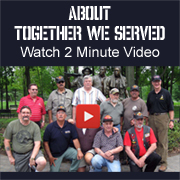


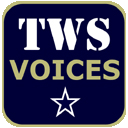
Read Other Interviews in the TWS Voices Archive | Share this Voices Edition on:


  |
|
TWS VOICES
Voices are the personal stories of men and women who served in the US Military and convey how serving their Country has made a positive impact on their lives. If you would like to participate in a future edition of Voices, or know someone who might be interested, please contact TWS Voices HERE.
This edition of Army Voices was supported by:
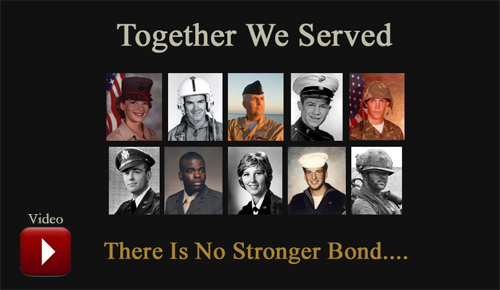
Army.Togetherweserved.com
For current and former serving Members of the US Army, US Army Reserve and US Army National Guard, TogetherWeServed.com is a unique, feature rich resource helping Soldiers re-connect with lost Brothers, share memories and tell their Army story.
To join Army.Togetherweserved.com, please click HERE.
| |